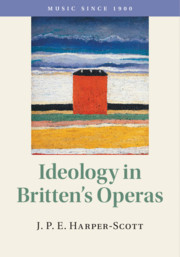
Cambridge and New York: Cambridge University Press, 2018.
Book description
This thematic examination of Britten’s operas focuses on the way that ideology is presented on stage. To watch or listen is to engage with a vivid artistic testament to the ideological world of mid-twentieth-century Britain. But it is more than that, too, because in many ways Britten’s operas continue to proffer a diagnosis of certain unresolved problems in our own time. Only rarely, as in Peter Grimes, which shows the violence inherent in all forms of social and psychological identification, does Britten unmistakably call into question fundamental precepts of his contemporary ideology. This has not, however, prevented some writers from romanticizing Britten as a quiet revolutionary. This book argues, in contrast, that his operas, and some interpretations of them, have obscured a greater social and philosophical complicity that it is timely – if at the same time uncomfortable – for his early twenty-first-century audiences to address.
Contents
List of Figures [xi]
List of Music Examples [xiii]
Preface [xv]
Part I: Mappa mundi [1]
1 Defining Ideology [3]
2. Ideological Narratives [23]
Part II: The Ship of State [67]
3. From Manifest Violence to its Historical Sediment [69]
4. The Occultation of History [111]
Part III: New World [173]
5. Women and Children [175]
6. A Shadow Falls on Castle Walls [215]
Bibliography [303]
Index [319]

You must be logged in to post a comment.